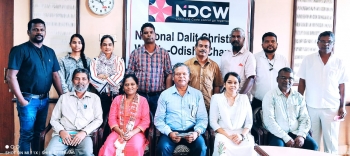
.jpg) Sujata Jena
Sujata Jena

Bhubaneswar: The National Dalit Christian Watch (NDCW) opened its Odisha chapter on August 6 to address the triple discrimination faced by the community in the eastern Indian state.
“Dalit Christians are discriminated triple times based on their caste, religion, and poverty. They are discriminated against in society, by the government, and in the church,” explained Jugal Kishore Ranjit, the NDCW state convener at the opening meeting organized at the Center for Youth and Social Development in Bhubaneswar.
As many as 15 representatives from different denominations and from all walks of life attended the meeting. They included students, social activists, development workers, lawyers, grassroots leaders, journalists, and pastors.
Purna Chandra Nayak, a retired police officer, said the Dalit Christians are shattered but not broken because God is with them. “However, the laity must come together to lead the movement and protest when our birth rights and constitutional rights are hampered,” he urged.
Another participant, Ashish Rajhans from the Baptist Church, bemoaned that Dalit Christians were totally neglected. “We are divided in the name of different churches,” said Rajhans who has more than 30 years of experience in the developmental field.
NDCW national coordinator Shibi Peter presented the objective of the organization.
One of its interventions, he said, is to engage and dialogue with Church, institutions and society through advocacy, lobbying, and legal intervention to ensure justice and space for Dalit Christians.
“We must make use of constitutional provisions to protect our fundamental rights. Compiling authentic data on Dalit issues, capacitating the young generation to counter falsehood with fact, and training them for positions of leadership for the Church and society are crucial,” he stressed.
The group came up with the following action plan:
* NDCW Odisha chapter will initiate a constructive dialogue with the government and Church authorities on the issues of Dalit Christian communities.
* The group will put pressure on the Church authorities to implement the Dalit policy in the state.
* The members would conduct a survey on the socio-economic situations of Dalit Christian communities in the state.
* The chapter proposes to prepare a booklet on the situations of Dalit Christian communities by compiling articles written by various representatives of Odisha.
* It would educate youth and laity on Dalit policy and distribute widely the Odiya version of Dalit policy of the Catholic Bishops’ Conference of India.
* The members decided to dialogue with other Churches about the creation of the Dalit policy.
* The chapter would strive to set up a minority commission in the state.
The NDCW is a national platform initiated by a few like-minded Dalit Christian leaders such as theologians, professionals, and activists, who have been serving the Dalit community in various capacities and promoting substantial changes in the life of Dalits. Besides Odisha, the NDCW has set its units in 13 other states.
The national coordinator announced a capacity-building training for Dalit Christian youth to equip them on human rights mechanisms and tools to address the caste practices that affect them within the Church and society.
He invited the group to send four well-oriented youth from the state for the training to be held from August 27 to 28 at the Jesuit-managed Indian Social Institute in Bengaluru. The youth would then train other young people in the state on their return.